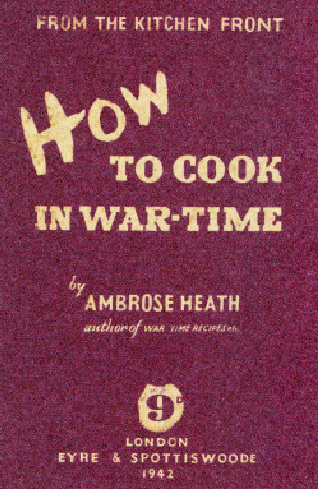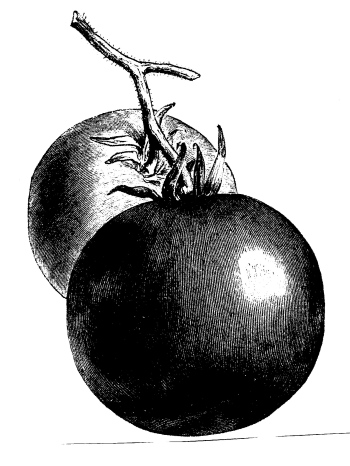Ambrose Heath & olive oil during wartime lead the Editor to wonder about some conventional wisdom concerning the insularity of the island kitchen.
Heath was one of the contributors to the “Kitchen Front” talks broadcast by the BBC during the Second World War. The talks were organized by the Ministry of Food to encourage frugality and palliate the hardship of rationing with recipes, household hints, exhortations from government officials and comedy. The “Kitchen Front” was a platform for propaganda, but of a homely and avuncular cast.
Heath was remarkably prolific, and published some 22 volumes during wartime alone. Conventional wisdom holds that he wrote for a relatively affluent audience, but his contributions to the “Kitchen Front” took aim at the working class. (Humble 89) Some readers of transcripts find Heath uncomfortable in his role as ‘government stooge’ looking down on social inferiors, but we cannot find much evidence of unease in the excerpts published as Kitchen Front Recipes in 1941. The talks are hortatory, and do sound pedagogical, but that was their point. The fact that Heath knew more about food than his non-specialist audience does not make him guilty of condescension.

In fact Heath assumes that his listener is not uncomfortable in the kitchen and indeed has mastered a number of cooking skills. His pudding recipes do not include instructions for making the suet pastry that was ubiquitous in England until the late twentieth century, and sometimes his recipes do not bother with measurements or even proportions.
We do, however, find evidence that perhaps the kitchens of England were less insular than the culinary commentariat has claimed. The use of olive oil is an example.
According to Elizabeth David, olive oil was sold only in pharmacies, for undisclosed medicinal purposes, during the England of the 1940s, and she gives herself credit for introducing the ingredient with Mediterranean Food in 1950. As is so often the case in the realm of food writing, the assertion has resurfaced repeatedly without independent research, let alone questioning.
Heath, however, gave his working class listeners a recipe based on olive oil in 1940, without preamble or pleading. It is presented as if it is a familiar substance, like parsley or an onion. Heath’s broadcasts were nothing if not practical; unlike David, who tapped a yearning for exotica, even fantasy, after a decade of austerity, Heath was trying to help his audience cope with the realities of wartime dislocation and scarcity. It therefore would have been unlikely for Heath to tantalize his listeners by recommending an ingredient that they did not recognize or could not obtain.
Both Heath and the Ministry of Food liked tomatoes, and advocated growing small crops on windowsills for use not only grilled or fried for the traditional English breakfast, but also in sauces and supper dishes. Kitchen Front Recipes, for example, includes a simple and superb tomato sauce based on olive oil and a tomato ‘pie’ that lacks pastry, an exercise in conserving precious rationed flour.
The recipes are clear and lively; the one for tomato sauce bears quoting in full. Unlike a number of tomato sauces from English sources, including one the based on a recipe by Elisabeth Ayrton in the britishfoodinamerica recipe archive, this one proclaims an Italian rather than English lineage, another indication that the English kitchen may not have been so narrowminded before the Age of David after all.
Ambrose Heath’s austere tomato sauce.
“My own tomato sauce is simplicity itself. Heat a little olive oil in a small saucepan until it smokes, then throw in some roughly chopped tomatoes, skin and all, a spoonful of chopped parsley, a pinch of salt, a pinch of sugar, some freshly ground black pepper, and a crushed clove of garlic or a slice or two of onion. Put on the lid, and simmer for exactly twenty minutes, then use it as it is (better), or strain it.” (Front 53)
The inclusion of garlic, also presented to Heath’s listener without explanation as a matter of course in the manner of a standard ingredient, also calls into question the conventional wisdom that it was an exotic item viewed with suspicion by wary British cooks.
We would peel the tomatoes; Heath did not, because waste of any kind was anathema to the relentless campaigning of the Ministry.
Heath’s wartime tomato and onion pie. This is a handy dish for service with charred steaks or chops.

Preheat the oven to 350°.
-2 large onions, peeled and sliced into thin crescents
-2 Tablespoons olive oil
-2 large tomatoes or the equivalent, peeled and thinly sliced
-about a cup of fresh breadcrumbs
-2 Tablespoons butter
-about ½ cup grated sharp Cheddar or Parmesan
- Blanch the onions in boiling water for a minute, then fry them in the olive oil over medium heat until golden.
- Season the onion and sliced tomatoes with salt and pepper, layer a pie pan or dish with two sets each of onion, tomato and breadcrumbs.
- Dot the pie with the butter, sprinkle it with the cheese and bake for about an hour, or until the cheese has melted and bronzed.
Notes:
- This time, Heath dispensed with unconditional austerity by peeling his tomatoes, to forestall an unpleasant texture.
- Heath ate his serving of tomato pie topped with a fried egg, which makes it a lovely light supper standing alone.
- We add some traces of parsley and a jolt of Worcestershire to the pie.
- In a nod to the strictures of rationing, Heath specifies “margarine or dripping” instead of butter. Bacon fat would be good.
Sources:
Ambrose Heath, Kitchen Front Recipes (London 1941)
Nicola Humble, Culinary Pleasures: Cookbooks and the Transformation British Food (London 2005)

